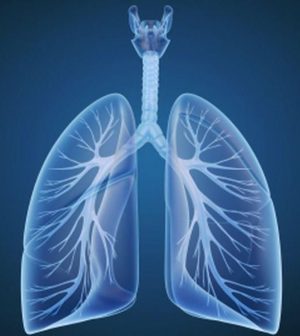- The Best Time of Day to Drink Bone Broth to Maximize Health Benefits
- 8 Ways to Increase Dopamine Naturally
- 7 Best Breads for Maintaining Stable Blood Sugar
- Gelatin vs. Collagen: Which is Best for Skin, Nails, and Joints?
- The Long-Term Effects of Daily Turmeric Supplements on Liver Health
- Could Your Grocery Store Meat Be Causing Recurring UTIs?
- Are You Making This Expensive Thermostat Error This Winter?
- Recognizing the Signs of Hypothyroidism
- 10 Strategies to Overcome Insomnia
- Could Artificial Sweeteners Be Aging the Brain Faster?
Newly Approved Drug Fights Lung Cancer Tied to Certain Genes

A newly approved lung cancer drug shows promise in improving survival in patients whose tumors carry a common and tough-to-treat genetic mutation, researchers say.
Sotorasib — brand name Lumakras — was approved May 28 by the U.S. Food and Drug Administration as a targeted therapy for non-small cell lung cancer patients with tumors that express the G12C mutation in the KRAS gene, and who have undergone at least one previous treatment for their cancer.
“Non-small cell lung cancer is the most common type of lung cancer,” noted oncologist Dr. Kevin Sullivan, who wasn’t involved in the new trial.
About 80% of lung tumors are non-small cell cancers, and mutations like the G12C KRAS gene mutation can be “particular drivers behind the cancer’s ability to grow, invade and spread,” explained Sullivan. He treats patients at the Northwell Health Cancer Institute in Lake Success, N.Y.
Sotorasib is designed to block the effects of the G12C KRAS gene mutation, which is found in about 13% of patients with lung adenocarcinoma, a common type of non-small cell lung cancer.
Until now, “the KRAS mutation was not felt to be actionable” in terms of effective treatments, Sullivan said.
The new international phase 2 clinical trial was funded by the drug’s maker, Amgen. The researchers assessed the effectiveness of sotorasib in 126 patients who had tumors with the G12C KRAS gene mutation.
Some tumor shrinkage occurred in 82% of the patients, and tumors shrank by at least 30% in about 37% of the patients, the researchers reported.
In comparison, patient response rates to current standard therapy ranges between 6% to 20%, the study authors noted.
Partial response to the drug — meaning the tumor shrank substantially and its growth was controlled for a period of time — was seen in 34% of patients, while 3% experienced a complete response, meaning that they were left with no evidence of cancer.
For tumors that shrank, the reduction was an average of about 60%.
The drug’s effects lasted an average of 11 months, with progression-free survival (meaning the tumor did not continue growing during this time) of nearly seven months. Average progression-free survival is two to four months with standard therapy, the study authors said.
The average overall survival for all patients in the trial was 12.5 months, according to the study, which is to be presented June 4 at the annual (virtual) meeting of the American Society of Clinical Oncology.
The findings were also published simultaneously in the New England Journal of Medicine.
As to side effects, about 7% of patients discontinued their sotorasib treatment because of severe side effects, but none of the effects were life-threatening, the study found. In 22% of patients, side effects were severe enough to require dose reduction. Almost 70% of patients had some type of side effect; the most common were diarrhea, fatigue, nausea and increased liver enzyme levels, the latter an indicator of liver damage, the researchers said.
“There are no therapies that have no side effects. However, as oncologists, we can usually control, prevent or manage them,” Sullivan noted.
The bottom line, according to study co-senior author and medical oncologist Dr. Ramaswamy Govindan, is that “sotorasib showed clinically significant benefit without any new safety concerns in patients with this specific form of KRAS mutant lung cancer.” Govindan is the chair of medical oncology at Washington University in St. Louis.
“This is a group of patients whose tumors have been difficult to treat and for whom we did not have targeted therapies,” he said in a university news release.
“The new drug is addressing an unmet need for these patients, targeting the most common mutation that we can go after,” he added. “We’re also continuing to investigate this drug in combination with other experimental drugs to see if we can further improve responses and survival.”
More than 200,000 new cases of non-small cell lung cancer are diagnosed each year in the United States, and lung cancer remains the leading cancer killer.
Commenting on the findings, Sullivan stressed that “the KRAS mutation is an important target, as it is particularly common in lung adenocarcinomas.”
He said that “the ability to offer patients with lung cancer whose tumors contain this specific mutation an oral targeted therapy that is particularly effective is enormously beneficial for patients, especially regarding their quality of life.”
Providing the medicine in a pill avoids “the traditional method of treating various cancers with intravenous chemotherapy,” Sullivan added.
He explained that, in this group of patients, the researchers were not aiming for a cure.
“The patients included in this study all had stage IV disease or metastatic disease and therefore any treatment administered to them is palliative in nature, with the goal of prolonging a patient’s life and hopefully easing symptoms as well,” Sullivan explained.
“Sotorasib was studied in the second-line setting, meaning after patients had already had worsening of their disease following treatment with standard first-line therapies, which usually include chemotherapy and immunotherapy,” he said.
More information
The U.S. National Cancer Institute has more on non-small cell lung cancer.
SOURCES: Kevin M. Sullivan, MD, division of medical oncology and hematology, Northwell Health Cancer Institute, Lake Success, N.Y.; Washington University in St. Louis, news release, June 4, 2021
Source: HealthDay
Copyright © 2026 HealthDay. All rights reserved.










